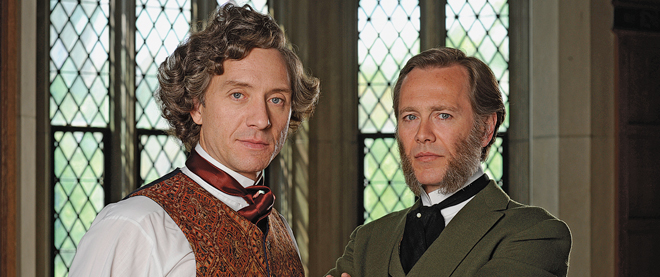The brilliant John A. biopic
Who said Canadian history was devoid of excitement?
Steve Wilkie/CBC
Share

Chances are you missed it, but something quite significant happened on the CBC Monday night. Indeed, I may say it was an event of some importance in the life of the nation: the historical drama John A: Birth of a Country. It is rare enough to see any Canadian history on Canadian television, and rarer still something of this quality. There have been subtler dramas, there have been more exact histories, but this is the finest historical drama to appear on the CBC since The National Dream almost 40 years ago.
Explaining the road to Confederation through the personal and political battle between Sir John A. Macdonald and George Brown, it should dispel forever a pernicious myth: that Canada’s founding, like much of its history, was a dry bit of horse-trading, devoid of interest or excitement. On the contrary, as any viewer of John A will be convinced, it was the creation of men of extraordinary passion and conviction, driven by personal ambition but guided by their own greatness toward an end much larger than themselves. The last half-hour, in particular, is simply riveting: the scene where Macdonald seeks to persuade Brown to join his cabinet—on his terms—is a study in psychological and political acuity.
That the show brings Macdonald so vividly to life (Shawn Doyle is marvellous in the part, wobbly accent notwithstanding) is an achievement, though not entirely surprising: he remains one of the richest, most colourful subjects in all of political history, a brawling, drunken, cheerfully unscrupulous rebuke to the whole “Peace, Order and Good Government” theory of Canada’s development, which has bored two generations of Canadian schoolchildren.
But we know Macdonald was great. Of much more significance is the treatment of Brown, at last restored to his true position in the historical firmament, second only to Macdonald among the Fathers of Confederation, and perhaps not even second. It is to Brown that we owe much of the design of the country: not only his famous insistence on “rep by pop,” or representation by population (apparently still a controversial idea), but the very principle of federalism, against the unitary state that was Macdonald’s dream. And it was his momentous decision to cross the floor, joining Macdonald in the grand coalition that would pursue federation with the other scattered colonies of British North America, that made the whole enterprise possible. All that we are, everything this country has become, can be traced to that supreme act of statesmanship.
Yet in popular terms at least, he remains very much the forgotten man of Canadian history. There are no highways or airports named for him, as there are for Macdonald and his Quebec lieutenant, George-Étienne Cartier. The last major biography him was J. M. Careless’s—52 years ago. He simply does not fit into the dominant, Macdonald-centred view of Canadian history as an orderly series of public works projects. He was a Victorian liberal: reform-minded, pro free trade, skeptical of government, with unfortunate (though by no means unusual for his time) views of Catholics and the French. As such he was an inconvenience, and so was made largely to disappear. With any luck, John A, and Peter Outerbridge’s doughty performance as George Brown, will begin to change that.
Good as it is, I do not see John A as an argument for public broadcasting (the question is not whether I like a particular show, but whether I can justify forcing others to pay for my pleasures; the subscription model, à la HBO, has more to recommend it, both on artistic and philosophical grounds). But if we are going to have public broadcasting, surely this is exactly the sort of thing it should be doing. Which makes it a mystery why the CBC should seem so intent on burying it. It’s bad enough that it has taken the corporation decades to produce a show on this, the single most important event in our history, but it has thus far committed only to this first instalment in what I gather was planned to be a four-part series on Macdonald’s life (drawing on Richard J. Gwyn’s shrewd biography, John A: The Man Who Made Us). For goodness sake, we’re only up to 1864: the adventure has barely begun.
What’s truly unforgiveable, however, is the lack of promotion. At a time when the network is blanketing the airwaves with ads for Battle of the Blades and other bilge, you’d think it could spare some of its PR budget for a project as important as this. Yet people working at the CBC were unaware it existed until a week ago. If the corporation were in any doubt of what it had on its hands (it shouldn’t: the producer, Bernard Zukerman, has a proven track record, as does director Jerry Ciccoritti and writer Bruce Smith) it cannot be now.
It is just too much like the CBC to turn what ought to have been a moment of triumph into a fiasco. Fortunately, there is a remedy. We’ve seen the pilot. Now green-light the rest of the series. Give it a decent time slot. And maybe tell the odd person it’s on.